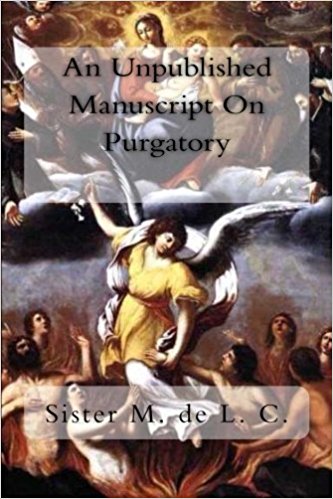|
|
|

Why
be so strict? We’re only human, and we all make mistakes. God is love,
so God will forgive everything in the end anyway.
 es, through the ages God has promised
us salvation through forgiveness. And, in the fullness of time, He fulfilled
this promise by redeeming us from our guilt through the life, death, and
resurrection of His Son, Jesus Christ. But redemption is one thing, and salvation
is something else entirely. es, through the ages God has promised
us salvation through forgiveness. And, in the fullness of time, He fulfilled
this promise by redeeming us from our guilt through the life, death, and
resurrection of His Son, Jesus Christ. But redemption is one thing, and salvation
is something else entirely.
Redemption
Redemption (sometimes
called justification) is God’s gift to us. It’s a gift,
unmerited on our part, that pays the mystical penalty for our
Original Sin. This penalty, which no man can ever
pay, and which even obedience to the sacred Jewish Law cannot erase, was
paid through the sacrifice of Christ. As Saint Paul said, “Christ died
for our sins in accordance with the scriptures” (1 Corinthians
15:3):
Through his
suffering, my servant shall justify many,
and their guilt he shall bear.
Therefore I will give him his portion among the great,
and he shall divide the spoils with the mighty,
Because he surrendered himself to death
and was counted among the wicked;
And he shall take away the sins of many,
and win pardon for their offenses. |
—Isaiah 53:11b–12 |
Christ, therefore, gave us life—that is,
freedom from our bondage to Satan and sin. In His empathic sacrifice, He took upon
Himself all the sins of humanity—from the beginning of creation to the end of creation—and
healed them with the pure love of His own death. Christ’s death was a glorious mystery
that reverberated from Heaven down to earth, for “obliterating the bond [of
Original Sin] against us, with its legal claims, which was
opposed to us, He also removed it from our midst, nailing it to the cross” (Colossians
2:14). Furthermore, this redemption worked in Christ’s death was an example to us.
It showed us, in a way that no event in the world has ever shown before or since, how we,
in our hearts—the very hearts God has created with love—and through our own free will,
constantly injure others and defile, mock, and execute divine love in every moment of our
lives.
Salvation
Christ’s sacrifice of Himself
bought pardon for the sins of the whole world; redemption, therefore, is
given to everyone.
But unless we accept that
gift of our own free will—through
repentance of our sins, through
baptism, and through continued repentance and
confession of sins committed after baptism—and
put that gift into action through a holy
lifestyle, we will suffer the consequence of eternal separation from
God.
Our salvation
from eternal separation from God, therefore, is our work and depends on our willingly
accepting the gift of our redemption; as Saint Paul
admonished us, “work out your salvation with fear and trembling” (Philippians 2:12b).
Thus to achieve salvation we must change our lives accordingly, turning away from our old
ways of sin and faithfully keeping the commands Christ gave us, through His own example,
so as to live as God created us to live: in pure
love and holiness.
Come now, let
us set things right,
says the LORD;
Though your sins be as scarlet,
they may become white as snow . . .
Let the scoundrel forsake his way,
and the wicked man his thoughts;
Let him turn to the LORD for mercy;
to our God, who is generous in forgiving. |
—Isaiah 1:18, 55:7 |
Baptism and
Betrayal
Now, in the early Church, baptism
fully affirmed this radical change in life.
|
Or are you unaware
that we who were baptized into Christ were baptized into His death? We were
indeed buried with Him through baptism into death, so that, just as Christ
was raised from the dead by the glory of the Father, we too might live in
newness of life. |
|
|
—Romans 6:3–4 |
|
But in today’s world, just
about everybody has forgotten the real meaning of
baptism: our death and burial to a life
of sin, and our rising into a life of
holiness. Most of us, however, are baptized as
infants, and then we proceed on a lifetime of
indoctrination into the unholy ways of the
world around us. We live in the world, blind to its
corruption; we live not as exiles in this vale of
tears but as eager competitors for all the material “salvation”
the world has to offer.
And Christ knew it would come
to this. Time and time again, throughout the Gospels, He warned us about
the “weeping and wailing and gnashing of teeth” that will occur
on the last day, that terrible day of judgment. Those who, like a fearful
servant, bury the graces God gives them—instead
of burying their lives of sin—and have not increased the value of what
is entrusted to them, will lose everything when the master returns and demands
an accounting (Matthew 25:14-30).
 One day, on account of some
fault which I had committed, my Divine Master gave me the following lesson.
“Learn,” He said, “that I am a Holy Master and One that teaches
holiness; I am pure and cannot endure the slightest stain. Therefore, thou
must act with simplicity of heart and with an upright and pure intention
in My presence. Know that I cannot endure the least want of straightforwardness,
and I shall make thee understand that, if the excess of My love has led Me
to constitute Myself thy Master, in order to teach and fashion thee after
My manner and according to My designs, nevertheless I cannot bear tepid and
cowardly souls, and, if I am gentle in bearing with thy weakness, I shall
not be less severe and exact in correcting thy
infidelities.” One day, on account of some
fault which I had committed, my Divine Master gave me the following lesson.
“Learn,” He said, “that I am a Holy Master and One that teaches
holiness; I am pure and cannot endure the slightest stain. Therefore, thou
must act with simplicity of heart and with an upright and pure intention
in My presence. Know that I cannot endure the least want of straightforwardness,
and I shall make thee understand that, if the excess of My love has led Me
to constitute Myself thy Master, in order to teach and fashion thee after
My manner and according to My designs, nevertheless I cannot bear tepid and
cowardly souls, and, if I am gentle in bearing with thy weakness, I shall
not be less severe and exact in correcting thy
infidelities.” |
—Saint Margaret Mary,
Autobiography, 51. |
So, in the end, just as the fearful
servant of the parable held his destruction in his own hands, your salvation
is in your own hands. You have all the
resources of the Church to assist you, but
if you fail to use them, or misuse them, you have only yourself to blame.
If you fail at your salvation because you aren’t willing to
sacrifice everything for it, out of
pure love and
joy, as in the parables of the treasure
buried in a field and the pearl of great price (Matthew 13:44–46), then,
sadly, you probably don’t desire it that
much to begin with. Thus it can be said that sending yourself to hell is
the ultimate form of self-punishment.
Hell
God is love, and God welcomes
us all into His presence. He loves us as we are, despite our
wretchedness—but those persons who do not
recognize and
repent their sins
reject God’s love for them, and those persons
who reject love have no place in His presence. Those who separate themselves
from God in this life by persisting in sin and refusing
to repent it will have no choice but to hide themselves from God in the
afterlife—and that “place” of eternal separation from God,
to which the soul’s own sins condemn it, is called hell. All
souls who end up in hell have no one to blame but themselves. Their only
place is hell, because hell, with all its selfishness and hatred, is the
place of those who reject love.
 Saint Teresa of Avila once
had a terrifying vision in which she saw the horrible place the devils had
already prepared for her in hell (The Book of Her Life, ch. 32, nos.
1-7). As she herself says, she hadn’t committed any egregious sins;
until that time in her life, she had simply filled herself with vain gossip
and friendships. What was missing from her life, then? Only love.
In fact, she spent 20 years in religious life before she even began to understand
the real love that is a necessity for
salvation. Saint Teresa of Avila once
had a terrifying vision in which she saw the horrible place the devils had
already prepared for her in hell (The Book of Her Life, ch. 32, nos.
1-7). As she herself says, she hadn’t committed any egregious sins;
until that time in her life, she had simply filled herself with vain gossip
and friendships. What was missing from her life, then? Only love.
In fact, she spent 20 years in religious life before she even began to understand
the real love that is a necessity for
salvation.
This tells us two important things
about heaven and hell.
1. |
Only pure love can
gain us entrance into heaven. |
2.
|
Sin excludes
us from heaven.
|
Consequently, a legalistic
life that focuses only on rules and regulations is not sufficient to gain
entrance to heaven; only a person with a humble,
loving heart, free from pride and
hatred, can be admitted to heaven. Conversely,
a “nice” person who does great, loving
deeds for others can still be excluded from heaven by unrepentant personal
sins.
|
Or, said in a
different way, Christ is our ticket to the wedding banquet. He freely gives
Himself to everyone, and, at the door to the banquet, we are admitted when
we present that ticket with love and faith. No other ticket will be honored,
nor can we earn a ticket through our own efforts. But, even if we have a
ticket, if we have not kept His commandments—if we have not put on the
wedding garments provided by Him—we will be thrown out of the banquet
into the darkness (see Matthew 22:1-14). |
|
In hell,
then, the fires of God’s love consume all deception, all lies, all
untruth—in short, all that has rejected love and its commandments—and
leave you, for all eternity, with the dead reality of your own emptiness.
When God says, “Be holy, for I am holy,” this is not just a call
out of sin and a plea for our acceptance of redemption; it is also a warning:
all that is not holy will be left to hell to suffer the pain of eternal
separation from God.
|
I tell you, to
everyone who has, more will be given, but from the one who has not, even
what he has will be taken away. |
|
|
—Luke 19:26 |
|
That is, to those who have grown
in love because they have opened their hearts to God, more love will be given
them. But to those who lack love because out of fear of
love itself they have buried it—pushed
it out of their hearts with narcissism—so that
it can never increase, everything they have will be lost. A million dollars,
a million soldiers, a million orgasms—all
pride and self will
be found to be worse than useless on that day of judgment before Christ the
King.
Purgatory
If God had wanted to just snap
His fingers and say, “You’re all saved,” then why did He go
to all the trouble of the Incarnation and Passion? The fact is, just wiping
sin away would have violated our
free will—and it would also violate divine
justice, as Jesus told Saint Faustina,
My mercy does
not want [the suffering in Purgatory], but justice demands
it. |
—Diary,
20 |
Note carefully that, contrary to popular
belief, the purifying, penetential suffering in Purgatory is not
punishment. In its psychological sense, punishment is a technique to decrease
specific behavior. After death, however, there is no need to decrease sinful
behavior. There is, though, a need to purge from all
souls the desire to sin which is spiritually
bound to all the sins the souls have committed through the course of their lives. This
purging of a desire and all the harm brought into the world through its associated sins
has been falsely called “punishment,” but it is properly called purification.
Thus, even though God forgives our sins
when we repent them while we are alive—that is, He constantly welcomes us back to Him
despite our sins—the stain of our sins must be removed from us after death in Purgatory
before we can endure the fire of His love in Heaven. In Heaven, any stain of impurity
will burn and torment a soul, so an impure soul will fling itself out of Heaven.
Yes, the purification process necessary to
remove the stain of our sins is painful suffering, just as Christ’s passion was painful
suffering. But the purification process of Purgatory is not arbitrary; the suffering is
as painful as it needs to be, and it takes as long as it needs to take, according to the
disposition of any particular soul. The “price” of a soul’s purification is penance
for all the accumulated spiritual damage caused by the sins that were committed by that
soul, and that penance is not something that can be evaded or simply dismissed. You can,
however, decrease the extent of your suffering after death if, before death, you follow
a spiritual life of holy penance that helps to make reparation for your sins and purge
from your heart the desire to sin. Then, depending on the price you pay in this life,
after death the remainder of the purging work will be done in Purgatory until your soul
becomes pure in its love for God.
According to the testimony
of the mystics, such as Saint Catherine of Genoa, who literally wrote the
book about
Purgatory, [1] we can understand something
very important about all this.
 As Saint Catherine learned, all
that separates a soul in hell from a soul in Purgatory
is sorrow for sin. Those
souls in hell are in hell, and eternally separated from God, precisely because,
in their physical lives, they declared their lack of love for God through
their refusal to acknowledge, repent, and pay for their sins. But if you can cry out to
God and say, “Have mercy, Lord, I was wrong. What I did was a sin. I’m
sorry. Teach me how to change my life. Guide me, and I will do what You tell
me,” then you can be reconciled with God and hope that when you die you will
get to Purgatory rather than hell. As Saint Catherine learned, all
that separates a soul in hell from a soul in Purgatory
is sorrow for sin. Those
souls in hell are in hell, and eternally separated from God, precisely because,
in their physical lives, they declared their lack of love for God through
their refusal to acknowledge, repent, and pay for their sins. But if you can cry out to
God and say, “Have mercy, Lord, I was wrong. What I did was a sin. I’m
sorry. Teach me how to change my life. Guide me, and I will do what You tell
me,” then you can be reconciled with God and hope that when you die you will
get to Purgatory rather than hell.
|
No matter what
religion you practice now, at the moment of your death you will find yourself
standing before Christ in the light of divine truth. Every act of your life
will be accounted for. It will all come down to one
question: do you really have sorrow for all your
sins? Truth will be absolute. There can be no excuses,
no deception. |
|
Brokenness—and
Healing
“I felt myself burning and
crumbling,” she said, “and . . . the worst was that interior
fire and despair.” Thus Saint Teresa describes an experience in which
the soul “tears itself in pieces.” And lacking any real love for
God to save it, the soul is left to its own eternal emptiness.
|
Is it any wonder,
then, that Christ chose the breaking of the bread to demonstrate to
us the brokenness of human reality?
And so we, in the Fraction Rite of the Mass, continually join ourselves to
His sacrifice, as we acknowledge that He alone, through His holy love on
the cross, can bring redemption and peace to our fragmentation. |
|
Now, you can experience this
process psychologically by giving up the worldly
identifications which “glue” your sense of “self” together
in the illusions of
identity; as
these bonds crumble, you will crumble into your real
despair. And
then you will be able to accept God’s love, for in emptying yourself of your petty
desires you make room for real
love, and in being filled with love is your
forgiveness and salvation.
|
God does not
“overlook” our sins—in fact, quite
the contrary: He knows that our sins will condemn us to everlasting separation
from Him if we do not repent them. But
if only we do repent our sins then God will receive us as deeply as if we
had never sinned at all. |
|
Of course, you can believe in
Zorba the Greek’s “Flap! Swap!” theory of forgiveness if you
want, and just sit back in smug satisfaction and wait for God to “forgive
everything anyway.” But I prefer to listen to a saint who, at least
eventually, knew what she was talking about.

Notes.
1. The online text (which is now in the public
domain) may be found at www.catholic-forum.com:
Treatise
on Purgatory by Saint Catherine of Genoa.
Recommended
Reading
 |
 |
Interview with
an Exorcist by Fr. Jose Antonio Fortea provides clear answers to questions about angels and
demons, the reality of evil, demonic activity, temptation and sin, demonic oppression
and possession, and the path to deliverance from evil influence.
Order
at Amazon.com |
|
 |
 |
Hungry Souls by Gerard
J.M. van den Aardweg recounts stories of
supernatural visits, messages, and warnings from Purgatory. These are trustworthy,
Church-verified accounts of earthly visitations from the dead in Purgatory. Accompanying
these accounts are images from the "Museum of Purgatory" in Rome, which contains relics
of encounters with the Holy Souls, including numerous evidences of hand prints burned
into clothing and books; burn marks that cannot be explained by natural means or duplicated
by artificial ones.
TAN Books and Publishers |
|
 |
 |
An Unpublished Manuscript on
Purgatory by Sister M. de L. C. recounts the mysterious relation continued for several
years between the living nun and a departed religious suffering in Purgatory.
“When the soul leaves the body it is as if it were lost in or, if I may say
so, surrounded by God. It finds itself in such a bewildering light that in the twinkling of an
eye it sees its whole life spread out, and at this sight, it sees what it deserves, and this
same light pronounces its sentence. If the soul deserves to go to Purgatory, it is so crushed
by the weight of the faults that still remain to be blotted out, that it hurls itself into
Purgatory.”
“In the great Purgatory there are several stages. In the
lowest and most painful, like a temporary hell, are the sinners who have committed terrible
crimes during life. For such souls, Purgatory is terrible. Next to these come the souls, who
though they did not commit great crimes like the others, were indifferent to God. They are in
Purgatory for the long years of indifference. They suffer unheard of pains and are abandoned
either without prayers or if they are said for them, they are not allowed to profit by them.
In the second Purgatory are the souls of those who died with venial sins not fully expiated
before death, or with mortal sins that have been forgiven but for which they have not made
entire satisfaction to the Divine Justice. Lastly, there is the Purgatory of desire which is
called the Threshold. Very few escape this. To avoid it altogether, one must ardently desire
Heaven and the vision of God. That is rare, rarer than people think, because even pious people
are afraid of God and have not, therefore, a sufficiently strong desire of going to
Heaven.”
Order
at Amazon.com |
|
|




 One day, on account of some
fault which I had committed, my Divine Master gave me the following lesson.
“Learn,” He said, “that I am a Holy Master and One that teaches
holiness; I am pure and cannot endure the slightest stain. Therefore, thou
must act with simplicity of heart and with an upright and pure intention
in My presence. Know that I cannot endure the least want of straightforwardness,
and I shall make thee understand that, if the excess of My love has led Me
to constitute Myself thy Master, in order to teach and fashion thee after
My manner and according to My designs, nevertheless I cannot bear tepid and
cowardly souls, and, if I am gentle in bearing with thy weakness, I shall
not be less severe and exact in correcting thy
infidelities.”
One day, on account of some
fault which I had committed, my Divine Master gave me the following lesson.
“Learn,” He said, “that I am a Holy Master and One that teaches
holiness; I am pure and cannot endure the slightest stain. Therefore, thou
must act with simplicity of heart and with an upright and pure intention
in My presence. Know that I cannot endure the least want of straightforwardness,
and I shall make thee understand that, if the excess of My love has led Me
to constitute Myself thy Master, in order to teach and fashion thee after
My manner and according to My designs, nevertheless I cannot bear tepid and
cowardly souls, and, if I am gentle in bearing with thy weakness, I shall
not be less severe and exact in correcting thy
infidelities.” Saint Teresa of Avila once
had a terrifying vision in which she saw the horrible place the devils had
already prepared for her in hell (The Book of Her Life, ch. 32, nos.
1-7). As she herself says, she hadn’t committed any egregious sins;
until that time in her life, she had simply filled herself with vain gossip
and friendships. What was missing from her life, then? Only love.
In fact, she spent 20 years in religious life before she even began to understand
the
Saint Teresa of Avila once
had a terrifying vision in which she saw the horrible place the devils had
already prepared for her in hell (The Book of Her Life, ch. 32, nos.
1-7). As she herself says, she hadn’t committed any egregious sins;
until that time in her life, she had simply filled herself with vain gossip
and friendships. What was missing from her life, then? Only love.
In fact, she spent 20 years in religious life before she even began to understand
the  As Saint Catherine learned, all
that separates a soul in
As Saint Catherine learned, all
that separates a soul in 

